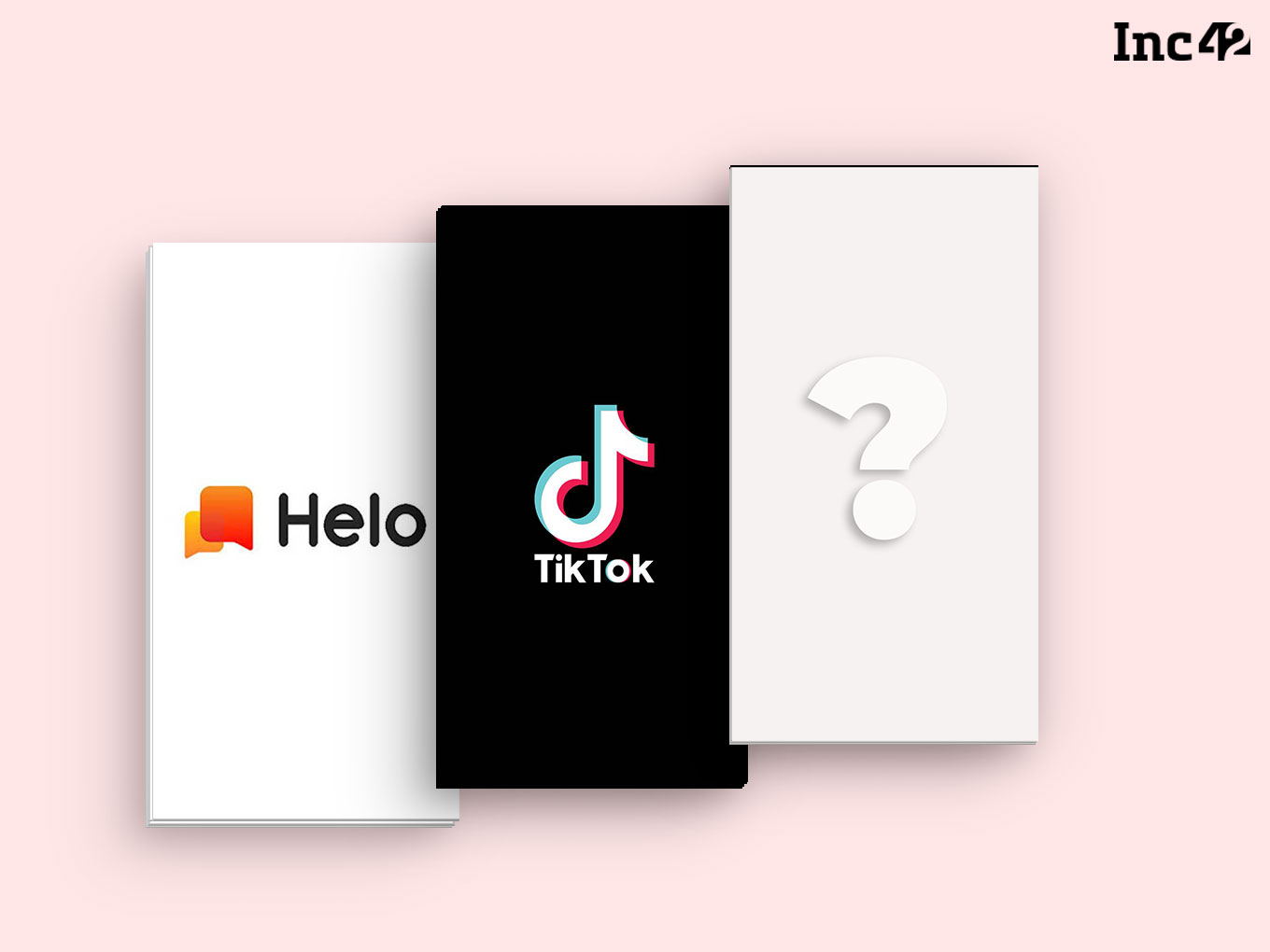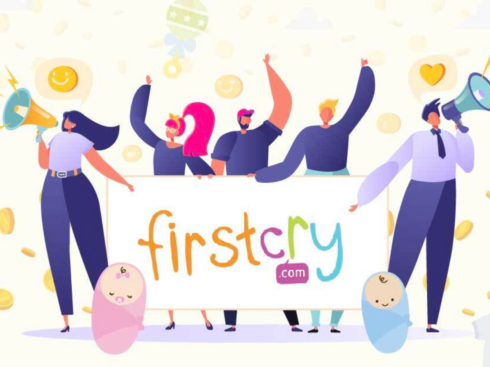SUMMARY
Catering to the huge regional language audience, Helo and Tiktok haven’t updated privacy policy from English
Majority of users who don’t understand English have no idea about the T&Cs they accept
Legal experts and a Supreme Court advocate told Inc42 it amounts to litigation
Over the years, Chinese social media platforms such as Baidu, Sina Weibo, Renren, WeChat and Youku have not only emerged as a substitute of Google, Twitter, Facebook, WhatsApp and Youtube in China, but have also shown that they hold great potential going head to head with international counterparts, outside the Great Firewall.
Today, if we look at the active users, along with the global leaders, China’s WeChat, Weibo, Tiktok, Baidu Tieba and Tencent QQ have also made it to the top 15 social networking platforms in the world.
After gaining significant market share in China, Chinese social media giants have quickly entered developing markets such as India, Bangladesh, Sri Lanka and other South Asian countries, to give Twitter, Facebook and Snapchat. For instance, founded in 2016, Tiktok has currently over 500 Mn active users compared to 326 Mn and 186 Mn active users on Twitter and Snapchat respectively.
With 1.3 Bn people, India is a dream country for social media platforms. However, not all these platforms are following the set standard norms. In this article, we will see how some of the most popular Chinese apps which have gained millions of users in India are not following the standard practices, which could amount to litigation. Having penetrated deep into rural India, the impact, in fact, could be huge.
The Great Invasion Of Chinese Apps
Early Chinese social media entrant WeChat failed terribly in its attempt to conquer the Indian market, but in the last two years, multiple Chinese apps such as Tiktok, Helo, Like and Vigo have been successful in garnering a massive user base in India, thanks to their increased focus on catering to non-English speakers in India.
According to a report, TikTok’s Android version had 17.11 Mn daily active users (DAUs) in India in November 2018. Helo, which was exclusively launched in India in June, 2018 claims to have 25 million monthly active users in the country. Its short video-sharing app Vigo Video is also popular in India and its Android app clocked 6.42 Mn DAUs in India in November 2018.
The rising internet users in Indian Tier 2 and Tier 3 cities have also made way for such apps which are built for Indian languages, called ‘vernacular apps’ by some. As more and more Indians have come online, catering to Indian languages has become a critical part of growth for internet companies.
Beijing-based ByteDance which was valued at $78 Bn in November, last year — a significant stakeholder of the Chinese startup ecosystem — has become the flagbearer for the so-called ‘vernacular apps’ in India.
With Tiktok (Douyin in China), Helo and Vigo, ByteDance has successfully slowed down the growth of home-grown vernacular social media platforms such as Sharechat. Before Helo’s India launch in June 2018, ShareChat was growing at 20%, but after the former’s entry, it’s growing at just 6% month-on-month. Available in 14 Indian regional languages with 25 Mn active monthly users in India, Helo is aiming for a 300% growth in 2019. While, Tiktok which is available in 10 Indian languages, has reportedly over 260 Mn users in India already.
The Indian regional language content market holds a huge opportunity for startups, as around 69% of the Indian population lives in rural India, where English speakers account for only a small fraction. And, it’s worth noting that based on the 2001 census figures, around 125 Mn Indians understand or speak English which is around 10% of the entire population, and a majority of them reside in urban India. Similarly, Hindi, despite being the most widely spoken language in India, is used by less than half the population i.e just 43.5%.
So clearly, there is a huge market for non-English and non-Hindi apps in India. That’s one of the key factors behind the splendid growth of these apps. In fact, many would say their viral growth is largely down to the fact that they are reaching non-Hindi speakers more effectively by communicating in regional languages.
And when growth is so hugely reliant on catering to these languages, the point of contention becomes that the privacy policy and terms and conditions that these regional language speakers agree too, are available in English only.
It’s a major issue in a country where more than 500 Mn new Internet users are expected in the next decade, with more than half this number not being able to speak Hindi or English.
Regional language speakers who want to use apps such as Helo, TikTok, Vigo don’t have any recourse but to agree to the apps’ terms and conditions in English. And, unlike other apps that also have multi-language support, these apps have built their reputation and burgeoning user base on the back of their support for Indian regional languages.
Are Helo And Tiktok Evading Norms?
ByteDance-owned Helo is fast becoming India’s one of the leading social media platforms, offering a timeline of memes, celebrity news, trending topics. Helo and TikTok are similar to Facebook or any other social network that lets you make new friends, share the latest jokes, status updates, and trending news. But they are largely unmoderated as far as we can tell, even though there’s been pressure on these apps to delete videos.
Both apps are available in India as well as in countries with a high concentration of Indians such as in USA, Canada, Singapore, Malaysia, Saudi Arabia, UAE, Oman, Kuwait, Qatar, Nepal, Sri Lanka, South Africa, and Bangladesh.
In India, the most widely used languages on Helo apart from Hindi are Tamil, Kannada, Telugu, Malayalam and Gujarati.
“In line with our approach to empower Indians to better express themselves, we see an opportunity in serving and reaching Indians across the world who would like to stay connected to their local communities in their local language,” a company spokesperson told Inc42
Like Helo, Tiktok is another hugely popular ByteDance-owned media app for creating and sharing short videos.
After going through TikTok’s web and mobile platforms – we found that — Privacy Policy, as well as Terms and Conditions (T&Cs), are in English on the mobile application; while the website version has both — English and Hindi. The privacy policy as well as the T&Cs, are not available in any other Indian language.
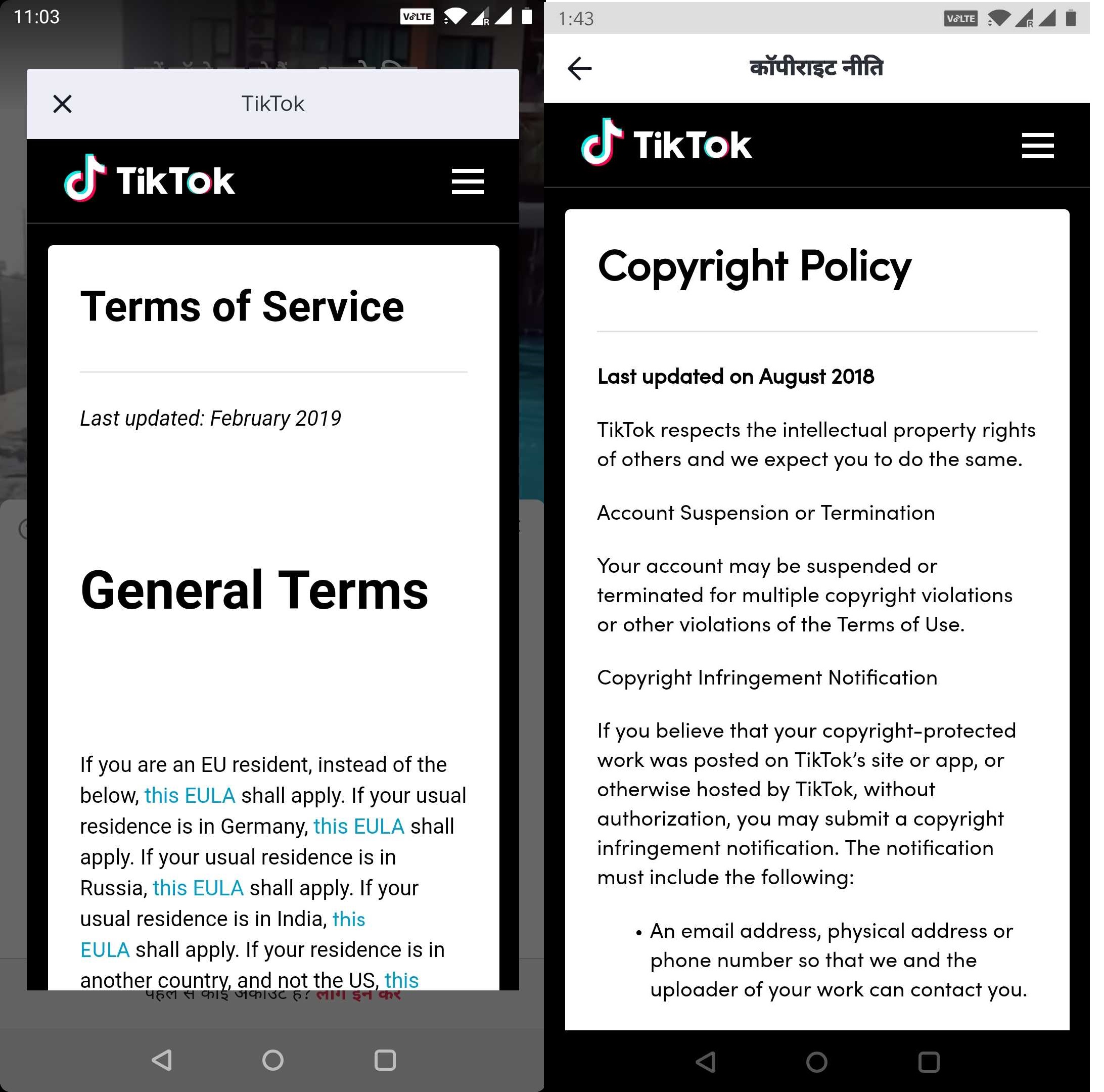
Below is the screenshot of Helo’s privacy policy and user agreement pages, when the language has been set in Odia.
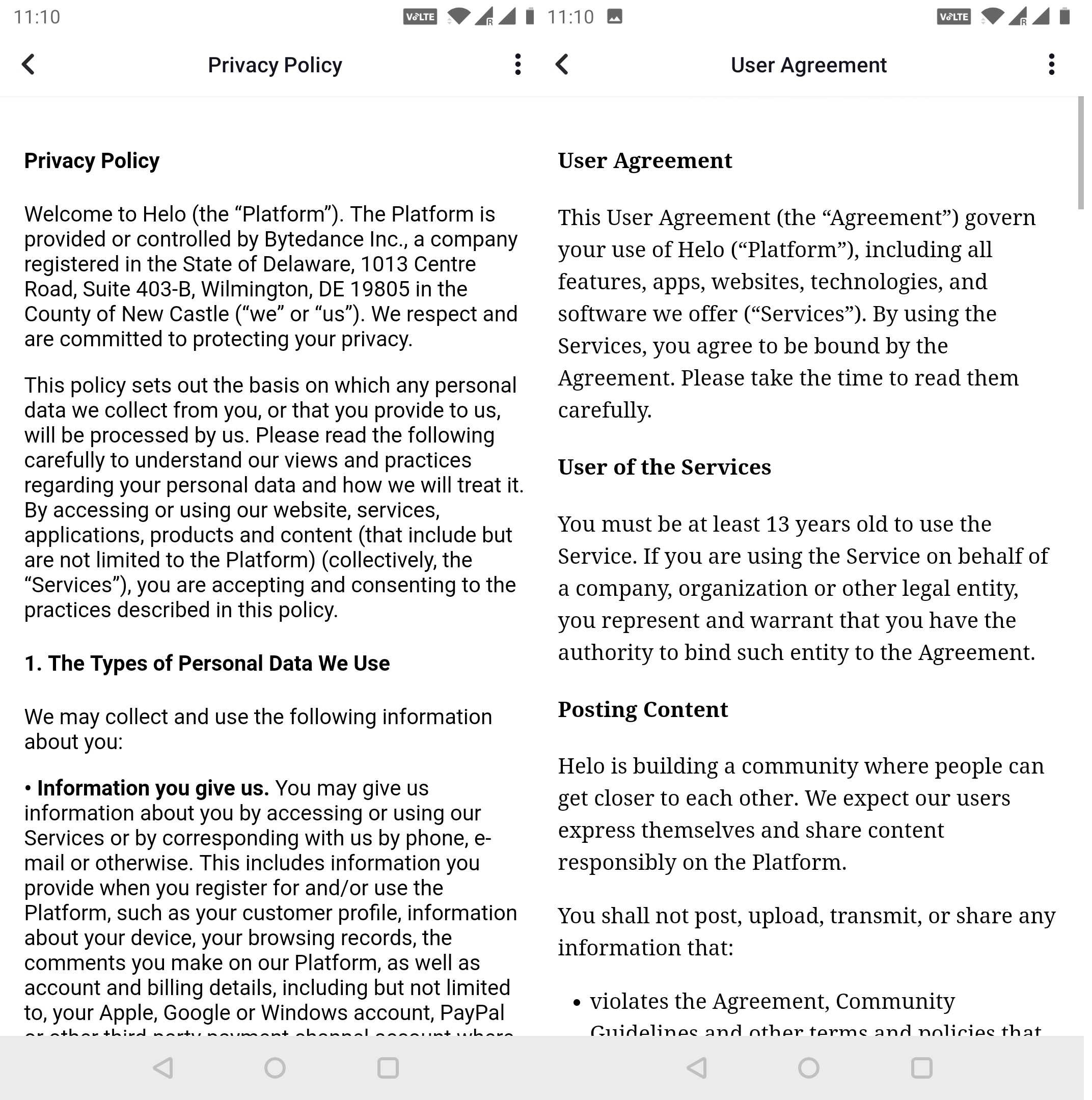
The big question is whether putting these contracts in a language that one of the parties doesn’t understand is legal.
Courting Legal Trouble and Litigation
Inc42 asked legal expert Rashmi Deshpande, a partner at Khaitan and Co, who said, “It is not directly a violation, however, it amounts to litigation. There is a contract that needs to be signed with the user in order to access and use the app and the contract has to be in a language that a user can understand. Because until and unless, a contract’s terms and conditions are known to both parties, it cannot be considered that this is a contract which has been understood and then signed. So, it is important to get those contracts in their local language.”
It is not directly a violation, however, it amounts to litigation.
Deshpande added that if the user has just signed the contract without understanding the same in order to be able to proceed further, it could be called a forceful contract. The user can obviously complain that this contract has been forced on them, and in a language that they do not understand.
Like Deshpande, Supreme Court advocate Vijay Pal Dalmia told Inc42 the language of a contract must be in a language known to all the parties in the contract.
In response to our queries, a Helo spokesperson said English is a widely spoken language in India. The spokesperson told Inc42, “While our current policies and service agreements are in English, which is widely spoken across India and is a common language across states, we have also identified the need to further harness a more localised approach to ensure that our users across India are equipped with all the information they need to make the most out of their product experience.”
“This being said, we are currently translating these policies and service agreements into all the local languages we serve on our platform,”the spokesperson added.
Of course, simply translating the policy documents would not fully solve the issue.
Simplifying Terms and Conditions
Last year, in July, the Justice Srikrishna Committee in their Draft Personal Data Protection Bill had clearly mentioned that such terms and conditions and policy documents not only need to be available in all supported languages but in contrast to the current practices, the content should be clear and simple to understand. The important stuff such as data sharing, data privacy should be highlighted clearly and explained in simple language that’s easy to understand at all levels of reading.
However, the draft bill has not been introduced in parliament yet. Khaitan and Co’s Deshpande said, “The rules in this regard are not yet into the place. And, that is why it is leading to so many litigations. Because the companies will boast that we have already provided you T&C but the other party argues that the T&C is in another language which it does not understand, so how can you keep me binding to this.”
In order to avoid such litigations, the draft bill had brought clarity to this, she said.
Further, in their privacy policy, TikTok and Helo do mention that user data is shared with selected third parties, outside the country as well.
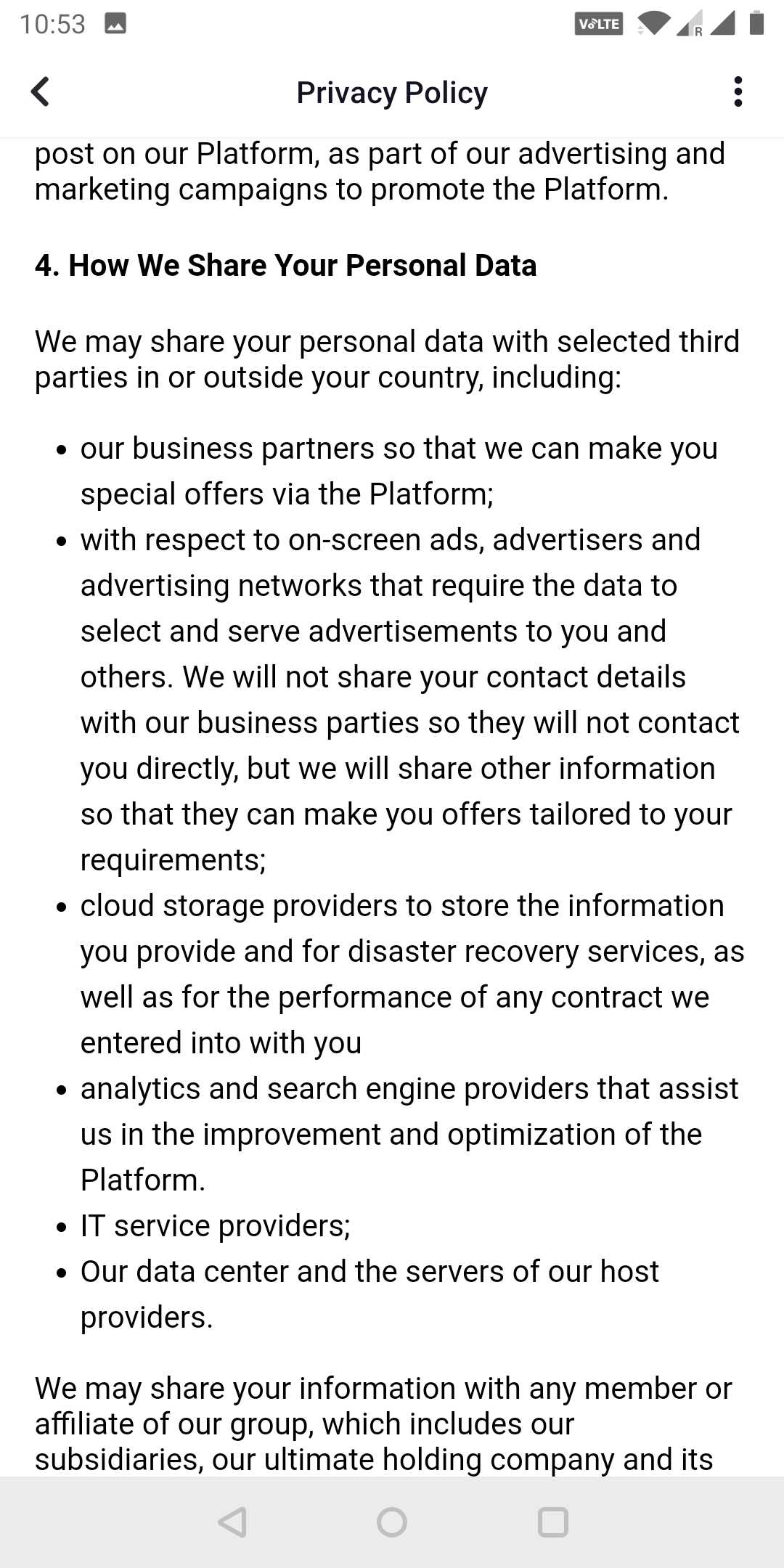
Despite this disclaimer, a bulk of the app’s users who use it in their language are not even aware of such data collection and sharing, as the privacy policy is not available in their language.
Interestingly, TikTok’s privacy policy, as well as T&Cs, has been customised for other international languages. For instance, if we change the language to Portuguese, the language of the privacy policy does change accordingly.
Sharing Indian users’ data with third parties, outside the country, (without user consent) could be in direct violation of TRAI recommendations on data protection.
Snapchat and ShareChat Buck The Trend
While Evan Spiegel, the CEO of Snap, the owners of Snapchat had said two years back that he wasn’t interested in expanding to poor countries such as India, the company after losing millions of users in 2018, is now forced to look at such growth markets, despite their lower purchasing power.
Snapchat recently announced localisation of its app in four Indian languages – Hindi, Marathi, Gujarati and Punjabi. However, unlike TikTok and Helo, the company’s privacy policy and T&Cs are available in all the four languages as well.
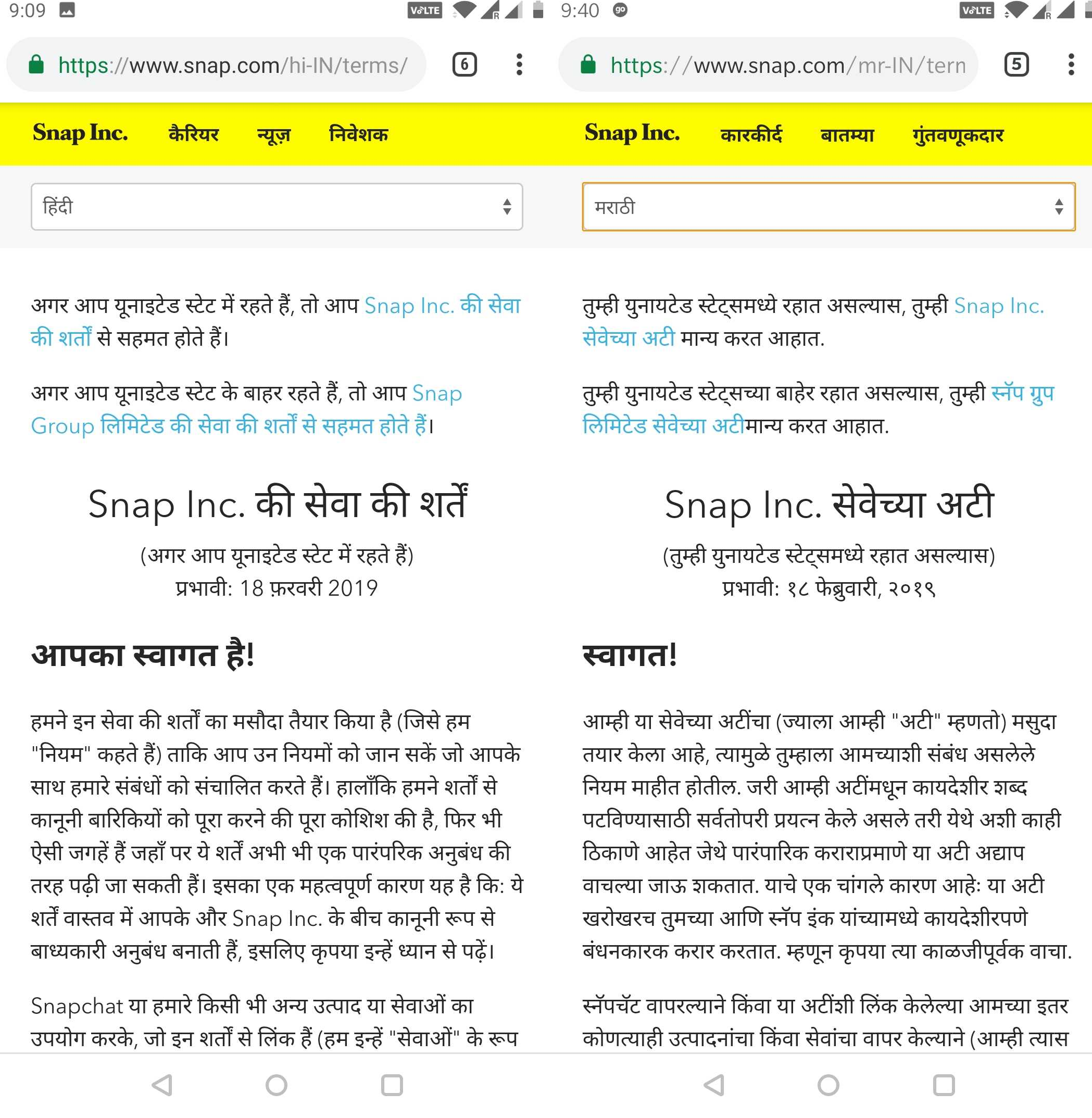
A Snapchat spokesperson told Inc42, “Both our privacy policy and terms of service are actually available in Marathi, Gujarati, Hindi and Punjabi (as well as many other languages) on Snap’s website. On the mobile app, you are served the terms of service and privacy policy in whatever language your device is set to.”
Interestingly, Snapchat is a public company and as such has more of fiduciary responsibility to have such provisions for all the languages it supports.
Another hugely popular homegrown ShareChat which is available in regional Indian languages only, and has over 45 Mn monthly active users, does offer the privacy policy as well as T&Cs in every language it supports. However, we were unable to open the pages directly in the app, and the link only opens in the browser.
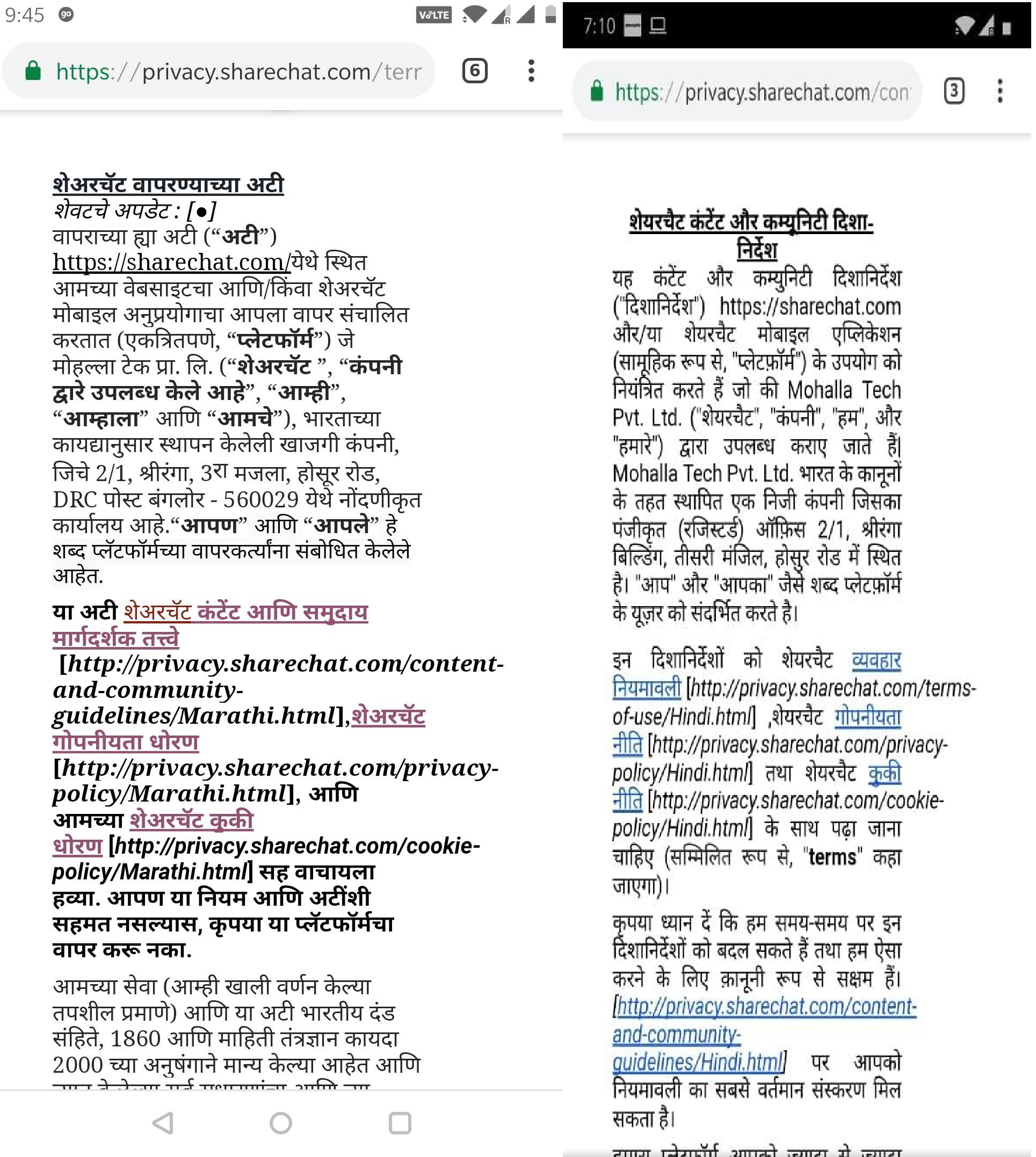
A ShareChat spokesperson told Inc42, “There is a technical issue as some updates are happening. But, it opens in Chrome.”
ShareChat does not share its data with any third party, said the spokesperson.
Helo And Tiktok Must Change Their Ways Before It Is Late
According to a Sensor Tower report from February, 43% of new users of Tiktok belong to India and 25% of its downloads happen on Indian turf. Yet, the company while launching its app in the Indian market, neglected a series of concerns which recently led the Madras High Court to order a ban on its use in India. On April 3, 2019, a two-judge bench consisting of Justices N Kirubakaran and SS Sundar directed the government to prohibit downloading of TikTok mobile app.
The Karnataka State Commission for Women approached Chief Minister HD Kumaraswamy seeking a ban of the app in the state and is set to file a petition in the Karnataka High Court, according to a report by The News Minute.
A section of the ruling party BJP has demanded not only to ban TikTok but Helo as well. The workers from Delhi BJP’s social media cell had urged the Election Commission to ban Helo in the country alleging China’s interference in Indian elections.
It’s clear that ByteDance, the owner of TikTok as well as Helo, has prioritised resources towards rampant growth, over responsible growth, which is definitely the need of the hour. If the Facebook Cambridge Analytica scandal and the GDPR in EU have taught us anything, it’s very important that apps and startups get their privacy policies and T&Cs right. Not making a user-friendly contract in every language you support is a big misstep.
It is essential and important in accordance with the standard practices which Indian companies largely follow that while drafting such contracts that the contracts must be in users’ opted language.
Update 1: 6.28 PM, April 15, 2019
The headline of the article has been updated.



